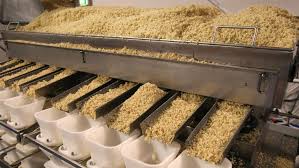
Akwa Ibom Set To Boost Rice Production With 1.5m Metric Tonnes Rice Mill
To advance food sufficiency in Akwa Ibom State, Governor Udom Emmanuel is set to boost rice production with the inauguration of a 1.5 million metric tonnes rice mill in the state.
The eventual goal, the Governor said, was to crash the price of the produce.
Emmanuel, announced this in Uyo when members of the Technical Committee on Agriculture and Food Sufficiency led by the Chairman, Professor Edet Udoh, presented some samples of the 50kg bags of the product to the State Executive Council in Uyo recently.
While making the presentation, Udo said the new rice mill located in Ini local government area of the state, had already produced over 10,000 50kg bags ready for the market with the intention to flood the market with the product after the commissioning of the mill.
The Technical Committee chairman said the feat was the outcome of an MoU singed between the state government and a private investor, Agricon, in July 2016.
Under the terms of the agreement, according to him, the state government was to, among other obligations, provide land for both farms and mill with access roads while Agricon was to set up and manage both farms and mills with requisite training for the workforce.
So far, Udoh noted that over 80 hectares of the 290 hectares of the farmland acquired for the exercise had been cultivated even as 176,000 metric tonnes of rice has been produced from the mill with installed capacity for 1.5 million metric tonnes.
Also, he noted that 10,000 of the 50kg bags of the Faro- 52 type long- grain rice were ready to hit the market ahead of the commissioning, while the committee was set to flood the market with the product after the commissioning with a view to crashing the price of rice in line with the Governor’s agenda to the committee.
Elated by the progress made so far by the committee, Emmanuel applauded Udoh and his team for their ability to translate his dream of food sufficiency which includes availability and affordability, for the people of the state.
Emmanuel recalled that the committee had earlier achieved a similar feat in the area of Garri production.
He noted, for instance, that Garri- the people’s staple – was selling for between 8 and 10 cups for N1000 when he assumed office; and that worried by the near unaffordability of the produce by majority of the people of the state, he then inaugurated the technical committee with the sole agenda of raising agriculture from subsistence status to a flourishing agro-business model, primarily to launch the state into an era of food sufficiency.
Today, the Governor noted, Garri sells for as much as between 35 and 40 cups for N1000.
He expressed delight that the technical committee, working in conjunction with the state Ministry of Agriculture and Food Sufficiency, was set to re-enact that feat in the area of rice, another staple.
